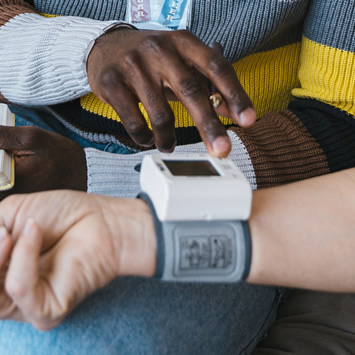
This month’s Lesson: Train caregivers to check Oxygen and vitals immediately when they see a problem before they call for more help.
By Maverick Castaneda – McDonald House Manager
It seemed like it was going to be a very good day. My work phone had not rung at all which meant all the residents were doing excellent. That was about to change. One of my caregivers called telling me that one of our residents has been acting weird. I asked her to be more specific. She said he was not making sense, not following commands, and his speech was slurred. I asked her to check all his vitals so I can call Hospice. She did and all his vitals indicated he was agitated. I called Hospice and requested a nurse to come to evaluate him because of his history of illness and Lewy body dementia. He also has had a stroke and several TIAs in the past. [A transient ischemic attack (TIA) is a temporary period of symptoms similar to those of a stroke. A TIA usually lasts only a few minutes and doesn’t cause permanent damage. Often called a ministroke, a transient ischemic attack may be a warning.] I thought he was having another TIA. We waited until she came to evaluate him and I was right–he was in fact having a TIA. She said to keep an eye on him since there is nothing they can do because a TIA can last an hour or even days.
We got him out of bed so we can keep a close eye on him. When his beloved wife arrived she decided to take him outside since the weather was nice. She said they were talking for a good 30 minutes until she realized he fell asleep. She decided to leave and let him sleep. She went to tell the caregiver she was leaving and to ask if they could bring him inside since he was in a deep sleep. When the caregiver went to get him she noticed he was not responding and his eyes were rolled back. She picked one hand up and it immediately fell into his lap. That is when the caregiver called me again.
When I first saw her call on the phone I was on another call with a hospice nurse so I decided to let the caregiver call go straight to voicemail. I have trained my staff that if I don’t answer when they call it is because I’m very busy at that moment but if it’s an emergency to call me twice and then send me an SOS message so I can drop what I’m doing and attend to their emergency. So that is exactly what she did. I called her right back as soon as I saw the message and she explained what was going on. I asked her to hurry and check his oxygen level–it was 55. I told her to hurry and put him on oxygen because he did have a PRN order for oxygen. As soon as the caregiver put him on oxygen she noticed he was talking more, he was more awake and alert. He seemed to be doing better afterward, but he did indeed suffer another stroke.
In order to save valuable time when residents are having problems, always train all staff to immediately check vitals and oxygen levels and have that information ready when asked for. It can save precious time in evaluating and potentially treating them.




